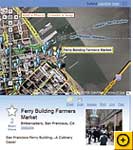Yellow Pages' Web-Based References Jump 20%; Book Form Still Relevant
NEW YORK (AdAge.com) -- As major media companies fret about how to keep the internet from cannibalizing their core business models, one print-based industry is finding traditional plus digital equals a whole greater than the sum of its parts.
Yellow Pages Association, the nonprofit trade group for the industry, conducted its annual usage survey and found references to the print books were down 100 million from last year (most surprising, that represents a decline of only 0.5%). But online references were up 300 million, or 20%.
Why print still works
"A lot of people would have predicted the death of this business a long time ago," said Neal Polachek, senior VP-research and consulting at Kelsey Group. "But what you can't do online yet is quickly and easily compare one plumber to another and make a couple calls. And that's the beauty of the book today."
It also perhaps points to the limitations of search and why, despite its promise, local-search ad spending is expected to reach $6 billion by 2010, while the yellow-pages industry is already a $14 billion business.
According to the YPA's usage study, the print and internet yellow pages aren't mutually exclusive, but complementary. In an average week, 49% of all U.S. adults refer to the print yellow pages and 6% refer to the internet yellow pages. In the course of a year, those numbers rise to 89% and 20%, respectively.
"We're not seeing any real product substitution going on," said Neg Norton, president of the YPA. "For our users, what they use depends on where they might be at the moment -- at work they're more inclined to use internet, at home they're more inclined to use paper."
Delicate balance
It's a delicate balance that the yellow-pages industry strikes with the internet, though, especially when companies like Google and Yahoo are both competitors and partners -- "our competition," Mr. Norton said.
Yellowpages.com, for example, distributes listings within a network that includes Google, Yahoo Local, Switchboard and AOL. The network is flexible, and yellowpages.com essentially acts as a reseller of that space.
"We recognize there are other players on the web, and although [yellowpages.com] is sizeable, all traffic doesn't come to yellowpages.com," said Matt Crowley, VP-marketing at yellowpages.com, a joint venture of AT&T and BellSouth. "The more we can provide access to others on the web the better for our clients."
Ultimately, the yellow-pages industry's deeply experienced and entrenched local sales team -- one that covers a lot of geographic ground and understands the needs of local businesses -- is one of its biggest assets and will likely remain unique to it, despite whatever number of new positions Google fills each week.
High-margin business
But like all traditional media, the yellow pages must also adapt. Right now it's a high-margin business -- on average running about 50% -- but it won't be that way forever, warns Mr. Polachek, who said there's an opportunity waiting to be tapped that would marry yellow-pages listings, opinion and user reviews, Angie's List-type reports and editorial content that might be in a newspaper.
Yellowpages.com has publicly surmised it may have a role to play in IPTV, a technology AT&T is using to deploy its nascent video service. Other applications for yellow-pages players might include in-car navigational systems.
In the meantime, internet yellow pages have been working to make their sites stickier and add features to give the online product the convenience of print. Yellowpages.com is offering click-to-see print ads and has added personalization tools that let users bookmark searches and make notes alongside listings, along with click-to-play audio ads. It's also contracting with MSN to use its virtual earth platform.
"We realize our core asset is our site, our brand," Mr. Crowley said.

